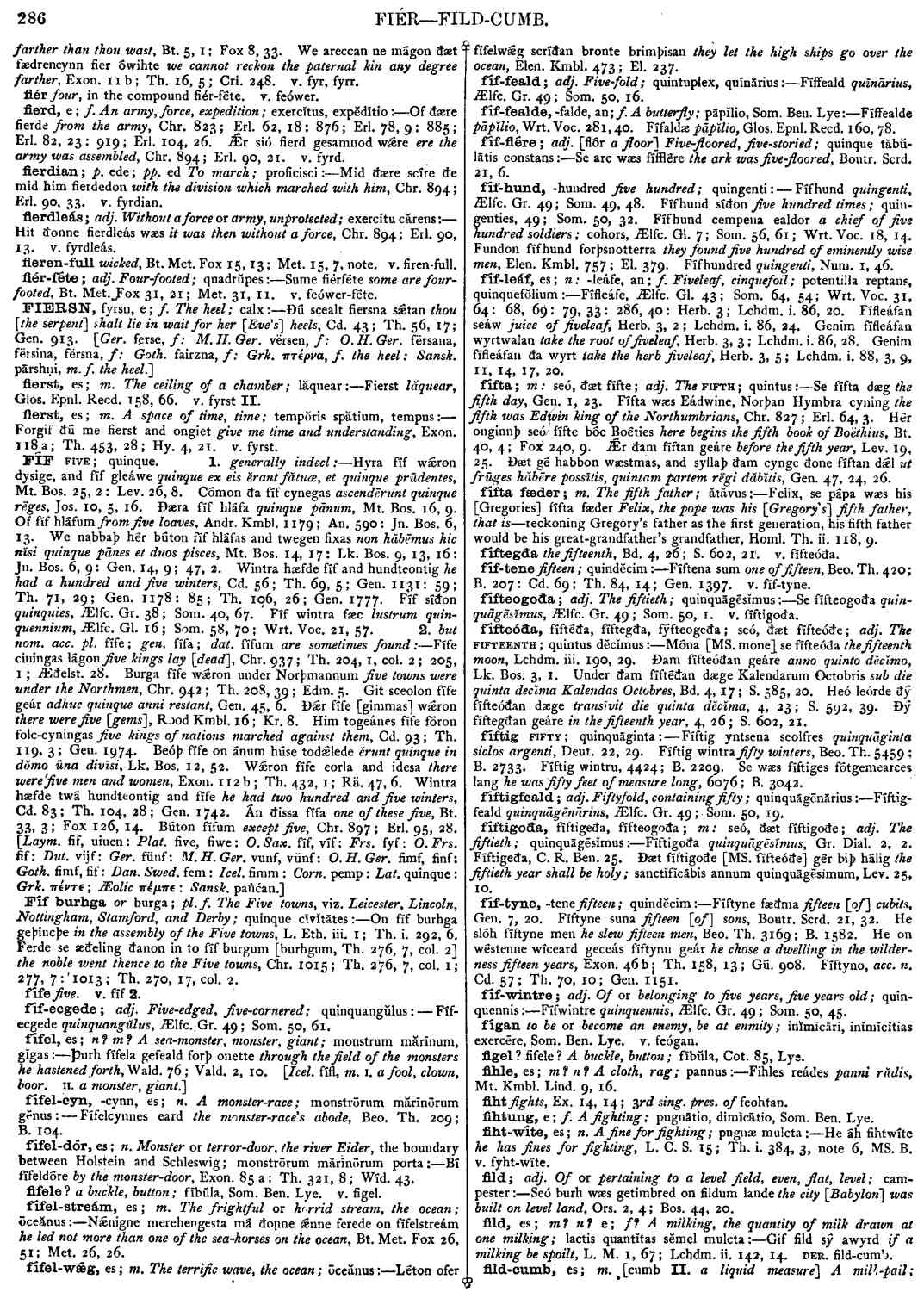FÍF
- noun
- numeral
- adjective
-
Hyra fíf wǽron dysige, and fíf gleáwe
quinque ex eis ĕrant fătuæ, et quinque prūdentes,
- Mt. Bos. 25, 2: Lev. 26, 8.
-
Cómon ða fíf cynegas
ascendērunt quinque rēges,
- Jos. 10, 5, 16.
-
Ðæra fíf hláfa
quinque pānum.
- Mt. Bos. 16, 9.
-
Of fíf hláfum
from five loaves,
- Andr. Kmbl. 1179 ;
- An. 590: Jn. Bos. 6, 13.
-
We nabbaþ hér búton fíf hláfas and twegen fixas
non hăbēmus hic nĭsi quinque pānes et duos pisces,
- Mt. Bos. 14, 17: Lk. Bos. 9, 13, 16: Jn. Bos. 6, 9: Gen. 14, 9 ;
- 47, 2.
-
Wintra hæfde fíf and hundteontig
he had a hundred and five winters,
- Cd. 56 ;
- Th. 69, 5 ;
- Gen. 1131: 59 ;
- Th. 71, 29 ;
- Gen. 1178: 85 ;
- Th. 106, 26 ;
- Gen. 1777.
-
Fíf síðon
quinquies,
- Ælfc. Gr. 38 ;
- Som. 40, 67.
-
Fíf wintra fæc
lustrum quinquennium,
- Ælfc. Gl. 16 ;
- Som. 58, 70 ;
- Wrt. Voc. 21, 57.
-
Fífe ciningas lágon
five kings lay [dead ],
- Chr. 937 ;
- Th. 204, 1, col. 2 ;
- 205, 1 ;
- Æðelst. 28.
-
Burga fífe wǽron under Norþmannum
five towns were under the Northmen,
- Chr. 942 ;
- Th. 208, 39 ;
- Edm. 5.
-
Git sceolon fífe geár
adhuc quinque anni restant,
- Gen. 45, 6.
-
Ðǽr fífe [gimmas] wǽron
there were five [gems ],
- Rood Kmbl. 16 ;
- Kr. 8.
-
Him togeánes fífe fóron folc-cyningas
five kings of nations marched against them,
- Cd. 93 ;
- Th. 119, 3 ;
- Gen. 1974.
-
Beóþ fífe on ánum húse todǽlede
érunt quinque in dŏmo ūna divīsi,
- Lk. Bos. 12, 52.
-
Wǽron fífe eorla and idesa
there were five men and women,
- Exon. 112b ;
- Th. 432, 1 ;
- Rä. 47, 6.
-
Wintra hæfde twá hundteontig and fífe
he had two hundred and five winters,
- Cd. 83 ;
- Th. 104, 28 ;
- Gen. 1742.
-
Án ðissa fífa
one of these five,
- Bt. 33, 3 ;
- Fox 126, 14.
-
Búton fífum
except five,
- Chr. 897 ;
- Erl. 95, 28.
Bosworth, Joseph. “FÍF.” In An Anglo-Saxon Dictionary Online, edited by Thomas Northcote Toller, Christ Sean, and Ondřej Tichy. Prague: Faculty of Arts, Charles University, 2014. https://bosworthtoller.com/10666.
Checked: 1